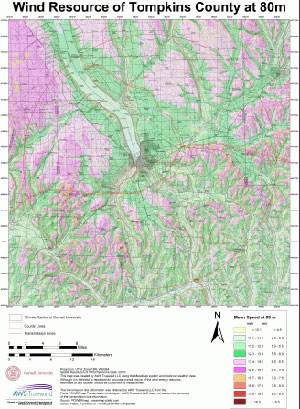Cornell Wind Turbine Project
In 2004 Cornell's Department of Utilities and Energy Management completed an investigation into the feasibility of whether locally produced wind-generated electricity would be cost effective for the Ithaca campus. This work was prompted by a request in the fall of 2003 by students from KyotoNOW!, an environmental advocacy organization on campus.
"The students are aware of many of the benefits of wind energy, and we agreed that looking into that possibility for Cornell made sense," said Lanny Joyce, Cornell manager of engineering, planning and energy management in the Department of Utilities and Energy Management. Joyce leads Cornell's Kyoto Task Team, chartered in 2001 to guide the university's effort to reduce energy use and carbon dioxide
emissions.
Cornell's utilities and energy management department then completed a wind inventory study for a 15-mile radius around Ithaca, and Mt. Pleasant, on university-owned property in the Town of Dryden, was identified as a possible wind resource site.
Wind Resources in Tompkins County
(click image to enlarge - 527 KB)
Large Version - 1.1 MB
The feasibility study ended in late April 2005.
When the university decided to investigate the possibility of producing wind-generated electricity, it noted that its feasibility study would consider several factors, including economic viability, environmental impacts and community input.
The university retains its belief that the use of wind energy could complement the other conservation and sustainability efforts the campus already utilizes (see the Cornell Sustainable Campus Web site: http://www.sustainablecampus.cornell.edu. Cornell will continue to work with those in the region who support wind energy, including the university's Kyoto Task Team that first proposed a wind study, and
encourage public discussion on the issue.
The university also will complete a bird and bat study of the Mount Pleasant site, led by the Cornell Lab of Ornithology, in hopes of advancing avian analysis of wind sites and new technologies using bioacoustics instead of radar.
In response to the cancellation of the Cornell project, a group of Tompkins County educators, students, and citizens who support renewable energy has formed to continue feasibility studies and renewable energy education. Tompkins Renewable Energy Education Alliance (TREEA), chaired by Beth Ellen Clark Joseph welcomes your input and support.

